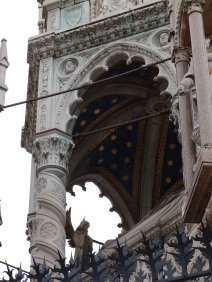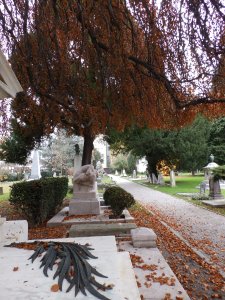“The life of the dead is placed in the memory of the living.” Marcus Tullius Cicero
 Last Sunday I took part in a free walking tour of my new home city, kindly organised by the City of Geneva. This particular walk was focused on Geneva’s parks and gardens and took the group on a meandering tour from the Brunswick Monument on the left bank of the lake across to the newly reopened Musée d’Ethnographie.
Last Sunday I took part in a free walking tour of my new home city, kindly organised by the City of Geneva. This particular walk was focused on Geneva’s parks and gardens and took the group on a meandering tour from the Brunswick Monument on the left bank of the lake across to the newly reopened Musée d’Ethnographie.
One of our last stops was the Plainpalais Cemetery, known locally as Cimetière des Rois (Cemetery of the Kings) in tribute to the notable personages buried there which include John Calvin, figurehead of the 16th century protestant reformation; Jean Luis Borges, famous Argentinian writer; Sofiya Dostoyevsky, daughter of Russian novelist Fyodor Dostoyevsky and many more illustrious personages.
I already knew the cemetery well, as it’s close to my work place, and I had passed through and visited on many an occasion. So when the tour guide told us that in the summer this was a common picnicking spot I didn’t exhibit the surprise of some of my fellow tourists. I had seen that with my own eyes and have in fact consumed lunch in the cemetery on more than one occasion.
When a colleague first took me to eat in the cemetery, on a beautifully sunny October day, she seemed almost apologetic for bringing me there. I think she thought I might find the idea of eating our homemade food amongst the dead as somehow unseemly.
I don’t know why people have an aversion to cemeteries or fear of the dead, which is presumably where the aversion to their resting place comes from. I don’t know if ghosts exist or not but if they do I don’t see that there is any reason to fear them. If there are ghosts then I imagine them to be a sort of reflection or echo of the person they once were and as I have a tendency to believe all people are pretty decent at heart I see no reason to think that their spirits would be any different.
It also seems strange to me the idea that there ought to be a respectful distancing of ourselves from the dead whereby the idea of showing any happiness or joy in these places of death is to be severely condemned, as though the deceased would want us wailing over them forever.
My only negative experience in a graveyard revolved around a primary school incident of trying to raise a particular spirit from their grave, which ended badly in getting me grounded for two weeks for returning home two hours later than I was supposed to (we were waiting for it to get dark).
But the truth is, I have always rather liked cemeteries. I have many fond, and wholly unsqueamish, memories of walking around burial grounds with my parents from an early age. I liked the flowers, the calm and trying to read the inscriptions washed away by time on the oldest tombstones. But mostly I liked reading through the names, the dates of birth and death, the families recorded in the same plot and taking a moment to stop and think about the once living people who now lay beneath the earth.
I think my love of history comes from the same basic root of wanting to find a way to connect with those of the past. To think how their lives may have been, what they may have felt, to imagine myself in their shoes and to wonder if anyone in the future will ever try to connect with an historical version of myself?
I suppose that is also why I have a strong desire to one day write a great novel in the same way others desire to make their mark in film, be renowned for scientific discovery, bring about a revolution or raise a legion of children, grand-children and great-grandchildren. It’s the desire to be remembered and, in recognition of the truth that our lives are but fleeting moments in history, to think that there is a way in which we may continue to live on beyond our allocated time.
So, I explained to my lunch companion that I felt no compunction in enjoying the autumn sun, eating my sandwiches and relaxing in a cemetery. I think the idea of the living mingling with the dead is somehow a rather comforting thought.
Those of us picnicking in Plainpalais cemetery probably haven’t chosen the spot because we have some sort of morbid fascination with the ghoulish, we have come because it is a pleasant spot to be in. And if, whilst we are there to enjoy ourselves, we take a moment to look at a few stones, to read the names carved upon and to take a moment to think about the people they memorialise then that seems a more honourable way to remember the dead than to keep a ‘respectful’ distance.



I agree we should respect the dead by acknowledging them not fearing them. It’s one of my problems with horror films ( that and the fact I’m a massive whimp) x
LikeLike
I like a good zombie film, which nowadays are often explained by some rabid deadly virus rather than the fact the dead are just evil. But have never liked ghost or paranormal activity horror films, because I’m also a wuss and I don’t like the evil dead concept.
LikeLike
I think death has been squeamishly sanitised over the last century – it’s one of those fixed immutable; life, death and taxes. No avoiding, so celebrate instead – apart from the tax element naturally!
LikeLike
Having had to fill in a tax self-assessment this year I’m definitely not going to celebrate that! Although it did turn out that the government owes me £1.60 so that’ll make a big difference to my finances and was definitely worthsthe hours and hours of time and phone calls to the helpline required to complete the form.
LikeLike
Brilliant! I loved reading this post. For some reason, it has put me into melancholic but very romantic mood!
LikeLike
Glad you liked it. Sounds like you need to wistfully wander around some graveyards! I’d definitely recommend the Plainpalais cemetery if you haven’t been yet.
LikeLike
I like cemetries – they’re usually so pretty, and I like reading all the names on the headstones (I have a bizarre obsession with names). I’m not sure I would eat in one unless other people were though – so in this one I clearly would.
LikeLike
I’m glad I’m not the only one that like cemeteries, although whether or not I’d eat in them definitely depends on the cemetery. In this one, there are lots of benches and there is a lot of green space between gravestones so that eating there is quite common. I am now very intrigued by what a bizarre obsession with names might constitute!
LikeLike
Haha, it’s not all that interesting. I’m just fascinated by names/naming patterns, etc. So when I’m in cemetries I like to check out which names occur most frequently. It’s not all that bizarre but other people seem to think it is 😉
LikeLike
I do find it interesting how the popularity of names can change so much over time but have never thought about checking the reality of this in a localised area like a graveyard. Doesn’t sound bizarre to me at all and I think I might start looking for patterns too next time I visit 🙂
LikeLike
Thought-provoking blog post this week, B. For me, this links to another event in my life, the funeral of a family member back home. Both have made me think about what the “right” way to act and feel is. For me, there’s nothing you can do on the day of/after a funeral that feels appropriate; everything feels wrong. I actually feel the same in a cemetery, like discussing trivial matters or not whispering is somehow out of order. I guess in both cases it’s accepting that life goes on after death, but I think I like the buffer of work, holidays, chores and mindless entertainment to distract me from the big Qs.
LikeLike
Oh Ali, I’m So sorry to hear about your family’s loss. I have to admit when writing this I didn’t really think about the grieving aspect of cemeteries and the fact that people go there to mourn their loved ones, rather than to briefly engage with the deceased they don’t have a personal connection to, and that their relationships with cemeteries will undoubtedly be different to mine. Life does go on after death but we keep those that are no longer with us alive within our memories. Hope you and the family are doing okay and hope the buffer helps you through this horrible time.
LikeLike